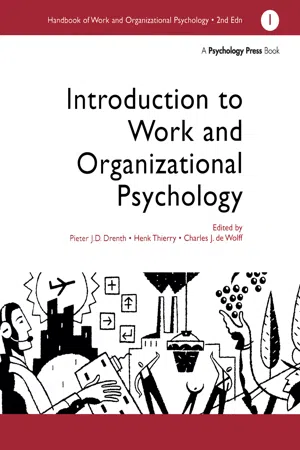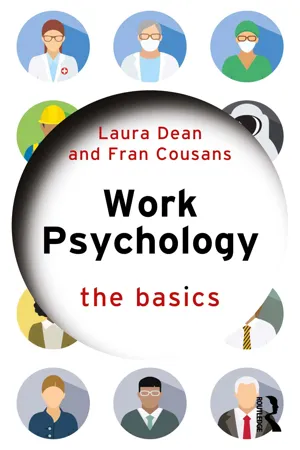Psychology
Psychology at Work
"Psychology at Work" refers to the application of psychological principles and research to the workplace. It encompasses areas such as employee motivation, job satisfaction, leadership, and organizational behavior. Psychologists at work may be involved in areas such as employee selection, training, and development, as well as addressing workplace stress and conflict.
Written by Perlego with AI-assistance
Related key terms
1 of 5
7 Key excerpts on "Psychology at Work"
- eBook - ePub
- Maria C.W. Peeters, Jan de Jonge, Toon Taris(Authors)
- 2023(Publication Date)
- Wiley-Blackwell(Publisher)
2005 ). As the goal of work is to produce something (goods, services, or knowledge), one central aim of work psychology is to facilitate obtaining that goal: how can we use the knowledge and insights of psychology to help workers achieve their work goals in an optimal and sustainable manner? Or, from an organizational point of view, how can we help organizations achieving their goals?Note that work psychologists are not only interested in pushing workers’ performance to (and perhaps even beyond) their upper limit. On the contrary, at present many work psychologists are primarily interested in maximizing worker health and well-being (this used to be different in the early days of work psychology—see Section 1.3 ). This interest partly follows from the idea that happy, satisfied workers are presumed to be productive workers (see Chapter 19 , for a discussion). In this view, maximizing worker well-being is the same as maximizing work performance. Additionally, as we believe that psychologists should improve people’s lives, work psychologists are genuinely interested in improving workers’ health and well-being. For example, the American Psychological Association (2023 ), the largest professional organization of psychologists, says in its mission statement: “Our mission is to promote the advancement, communication, and application of psychological science and knowledge to benefit society and improve lives.” Similarly, the British Psychological Society (2023 ) states that it “helps to influence and develop a psychological approach to policy-making that puts people first.” Similar statements can be found on the web sites of other professional organizations for psychologists. Clearly, work psychologists are not solely there for the benefit of organizations or employers, but surely also for the benefit of workers. This is not to say that a focus on worker health and well-being can or should not be beneficial for organizations as well. It is by now well-accepted that work can have adverse effects on worker health and well-being (e.g., consider the potential effects of working with harmful and even carcinogenous substances, or of being chronically bullied by your supervisor and co-workers). Since many organizations frequently face difficulties in finding suitably trained personnel, it is important to them that their current staff remain healthy and motivated. Moreover, the costs of replacing sick employees are high, which also underlines the need for organizations to make sure that the workability of their current staff remains high. Stated differently, contemporary work psychology aims to promote what might be called employee sustainable performance: a regulatory process in which an individual worker enduringly and efficiently achieves particular desired work goals while maintaining a satisfactory level of well-being (Ji et al., 2021 - eBook - ePub
A Handbook of Work and Organizational Psychology
Volume 1: Introduction to Work and Organizational Psychology
- Charles De Wolff, PJD Drenth, Thierry Henk, Charles, De, Wolff, P J D Drenth, THIERRY HENK(Authors)
- 2018(Publication Date)
- Psychology Press(Publisher)
individual (and therefore to individual differences), such as selection, performance assessment, designing a career plan, support and advice in case of difficulties, etc. In other subject areas, however, individual differences among those employed remain a little more in the background and attention is focused on the behaviour of what we wish to call “sets” of people. Such a set may have the characteristics of a group, defined in a social-psychological sense—such as semi-autonomous or self-steering units in a company—but this is not necessarily the case. Consider topics such as (re)designing work tasks, enhancing productivity, flexibilizing employment conditions, reducing the chance of stress. The common element in human behaviour, then, is for example their position as employees in a work organization, the fact that they come under the same Collective Labour Agreement, or that they attend the same course or take the same training. It is true that work and organizational psychologists are concerned with human behavioural characteristics in relation to these topics, but not (primarily) with individual differences.Second, we have the concept of employment or work. In a strict sense, work refers to the activities someone performs based on his or her position in a work organization and entitle him/her to an income or another financial recompense. This context applies to most topics in work and organizational psychology. But in addition, an increasing amount of interest has developed for topics relating to other forms of work. For example, it is important to know what interests and objectives pupils consider concerning their first position, how entrants to the labour market are made fully aware of the standards and values in their first company (socialization), how people suddenly confronted with dismissal can be motivated by devoting themselves to new challenges, how the elderly are prepared for the time in which they no longer have a job, and so on. More and more people will also (have to) adjust themselves to having more than one career, constant further training and retraining and using leisure time meaningfully during intermediate “jobless” periods.The third aspect, behaviour at work in or in connection with a work organization - eBook - ePub
Work Psychology
The Basics
- Laura Dean, Fran Cousans(Authors)
- 2023(Publication Date)
- Routledge(Publisher)
This chapter describes the key aspects of psychological theories and looks at philosophies in conducting psychological research. We will discuss different research methods and designs used by work psychologists and the pros and cons of each, then look at how data can be collected during research. How these approaches can be applied by psychologists will be discussed, and finally this chapter will introduce how research and practice are (or should be) intrinsically linked in work psychology.Theories in Work Psychology
Like many subdisciplines of psychology, work psychologists in research rarely wear white coats and protective goggles, or work in laboratories (you’ll more often spot them, funnily enough, in business attire). What they do do, however is generate theories, gather information relating to a theory and then analyse that data to tell us something about the human condition or experience that we didn’t know before – as all scientists, including work psychologists, should.What is a Theory?
A psychological theory can be defined as ‘an organised collection of ideas that serves to describe, explain or predict what a person will do, think or feel’ (Arnold et al., 2016, p. 35). A theory in work psychology should therefore be able to fill in the blanks: ‘if ____, then people will ____’. Arnold and colleagues outline five elements which need to be included in theories for them to be successful, which have been adapted below: - Andrew J. Vinchur(Author)
- 2018(Publication Date)
- Cambridge University Press(Publisher)
They also know a great deal about work motivation, leadership, employee satisfaction, group processes, and organizational culture, among many other topics. This is all useful information developed over 100-plus years of research and practice. Yet understanding the meaning of work has generally not been seen as an important part of that tradition. I need to be clear here that I am not implying that the early industrial psychologists or their disciplinary des- cendants were unconcerned with worker welfare or that their research and practice have not benefited workers. Understanding work as a means to something else, such as productivity, however, is not the same as under- standing the meaning of work in our lives, although I-O psychologists have in recent years begun to devote more effort in this area (e.g., Ford, Hollenbeck, & Ryan, 2014). Defining what we mean by the word work is not a simple matter. Our common-sense conception is that work is something we do in exchange for compensation and that it is something that, for the most part, we would not do if we were not compensated. But even superficial scrutiny of this The Central Role of Work in Our Lives 5 definition reveals problems. What about individuals who work without compensation? What about persons who enjoy their work so much that work encroaches on their nonwork time? We get little help from the dictionary. The Shorter Oxford English Dictionary (2002) has fourteen separate definitions of work as a noun and an additional twenty-three definitions of work as a verb. In a chapter describing how work is funda- mental to human nature, Weiss (2014) proposed a definition of “working” as “agentic activity done with the purpose of changing the environment” (p. 39). While admitting that this is not the definition of work, he saw this definition as a useful starting point for developing a science of the sub- jective experience of working.- eBook - PDF
- Graham C. Davey(Author)
- 2014(Publication Date)
- Wiley-Blackwell(Publisher)
How to balance the needs of the employer with those of the employee is the primary concern of organisational psychology. Employers want to optimise performance, while employees want to ensure that their efforts are duly rewarded and that they have a positive work experi-ence. This is a difficult balance to strike, but is the crux of what organisational psychology is about. In the early 1900s, psychology was concerned with ‘efficiency engineering’ (Moorrees, 1933). This was a production era, where efficiency and output were priori-tised using the principles of scien-tific management (Taylor, 1911; Focus Point 23.1). In the meantime, psycholo-gists became concerned about the ‘welfare spirit’ of workers, sow-ing the seeds of the human rela-tions approach (Roethlisberger & Dickson, 1939). This approach focused attention on employee work needs and work motiva-tions , and recognised the impor-tance and motivating power of workplace relationships. Both scientific management and human relations approaches to managing performance ignored the role played by wider economic and social factors. It is clear, however, that performance is contingent on many dif-ferent internal and external factors (Trist & Bamforth, 1951). Alongside this, psychologists have also increas-ingly become interested in looking closely at how employees experience and make sense of organisa-tional life (Symon & Cassell, 1998); in other words they are interested in processes and qualitative approaches rather than merely considering outcomes, such as productivity. 23.2 ORGANISATIONAL BEHAVIOUR Behaviour in organisational contexts is known as organi-sational behaviour . If psychology can help in the predic-tion and understanding of organisational behaviour, it can inform on how to increase desirable behaviours and eliminate and/or reduce the likelihood of undesir-able behaviours. - eBook - PDF
Psychology
Modules for Active Learning
- Dennis Coon, John Mitterer, Tanya Martini, , Dennis Coon, John Mitterer, Tanya Martini, (Authors)
- 2021(Publication Date)
- Cengage Learning EMEA(Publisher)
Many psychologists working in business, of course, are concerned with improving work efficiency , defined as maximum output at lowest cost. As a result, they alter conditions that they believe will affect workers (such as time schedules, work quotas, bonuses, and so on). Some might even occasionally wish that people would act like well-oiled machines. However, most psychologists working in business recognize that psychological efficiency is just as important as work efficiency. Psychological efficiency refers to maintaining good morale, labor relations, employee satisfaction, and similar aspects of work behavior. Leadership styles that ignore or mishandle the human element can be devastatingly costly. Studies have consistently found that happy workers are productive workers (Dik, Byrne, & Steger, 2013; Lavy & Littman-Ovadia, 2017). Theory Y Leadership The term Theory X was coined by psychologist Douglas McGregor (1960) as a way to distinguish the leadership style associated with scientific management from Theory Y , a newer approach, which emphasizes human relations at work. How is this approach different? Theory Y leaders have a person orientation rather than a task orientation and tend to assume that workers enjoy autonomy and are willing to accept responsibility. They also assume that a worker’s needs and goals can be meshed with the company’s goals and that people are not naturally passive or lazy. In short, Theory Y Applied psychology The use of psychological principles and research methods to solve practical problems. Industrial/organizational (I/O) psychology A field that focuses on the psychology of work and on behavior within organizations. Theory X leadership (scientific management) An approach to leadership that emphasizes work efficiency. Work efficiency Maximum output (productivity) at lowest cost. Psychological efficiency Maintenance of good morale, labor relations, employee satisfaction, and similar aspects of work behavior. - eBook - PDF
- Don Dinkmeyer(Author)
- 2019(Publication Date)
- CRC Press(Publisher)
3 TH E PSYCHOLOGY OF PEOPLE AT WORK Employee motivation is a com p lex science, but its foundati ons rest on the sim p le recognition that we all need to fe el im p ortant in some phase of our lives. Terrence Deal and Allen Kennedy (1 982) I NTRODUCTION Leadership is a person-to -person skill, and each person has his or her own unique style relative to applying the skill. Many management challenges are people issues, and the ability to apply practi cal behavioral science theory to specific work-related situations chara cterizes the most successful leaders. Applied behavioral science can be invaluable in providing clues to understanding employee behavior and motiva ting worke rs toward enhanced self-esteem and increased productivity. This chapter provides a theore tical overview to the entire book by summarizing what we have found significant in our roles as consulting psychologists to various organizations. Although we utilize many different psychological techniques, we have found one useful approach to business issues based on the work of the noted psychiatrists Alfred Adler and Rudolf Dreikurs. 71 72 Leadership by Encouragement SUPER LEADERSH I P In An Introduction to the 1beory and Practice of Life-Style Assessment, Eckstein uses the acronym SUPER to represent fundamental Adlerian principles. 1 The letters stand for the following: S ocial interest U nity P rivate logic E quality R easons S oc i a l Interest u p E R Social interest is chara cterized by a willingnes s to cooperate with others for the common good of all-the universal interrelatedness of all human beings. The term humanistic identification has also been described as a feeling of close kinship with other human beings in the present as well as a strong affinity for the human race as a whole, past, present, and future. High social interest in the workplace connotes a sense of belong-ing, cooperation, and responsibility.
Index pages curate the most relevant extracts from our library of academic textbooks. They’ve been created using an in-house natural language model (NLM), each adding context and meaning to key research topics.






